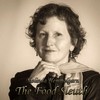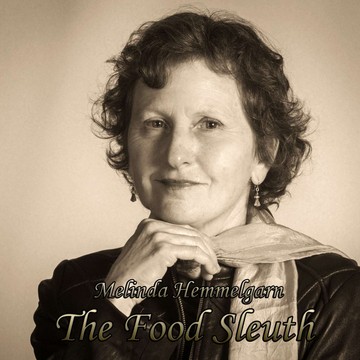

Food Sleuth Radio
Melinda Hemmelgarn
Dietitian Melinda Hemmelgarn helps listeners “think beyond their plates,” connect the dots between food, health and agriculture, and find food truth.
Episodes
Mentioned books

Feb 13, 2025 • 28min
David Wiss, PhD, RD, discusses food’s role in mental health, disordered eating, and addiction recovery.
In this engaging conversation, David Wiss, an award-winning registered dietitian and nutrition pioneer, delves into the significant role of food in mental health and addiction recovery. He challenges the 'all foods can fit' philosophy, highlighting its potential pitfalls. Wiss argues that nutrition should be viewed as a social justice issue, especially for marginalized communities. He also discusses the effects of ultra-processed foods on mental health and the need for accountability in the food industry to foster better eating habits.

Feb 7, 2025 • 28min
Mike Kostyo, MA, discusses food and societal trends for 2025.
Did you know that over 30 percent of consumers say most of their meals are eaten alone? Join Food Sleuth Radio host and Registered Dietitian, Melinda Hemmelgarn for her conversation with Mike Kostyo, MA, Vice President of Menu Matters, LLC, and “trendologist.” Kostyo will discuss food and societal trends for 2025, including flavor, travel, trade and GLP-1 drugs. Kostyo says one way to address our national epidemic of loneliness and disconnection is to share more meals with others, and he encourages us to enjoy new food experiences in 2025.Related Websites: https://menumatters.com/ https://www.linkedin.com/in/mrkostyo/

Jan 31, 2025 • 28min
“Sioux Chef” Sean Sherman discusses colonization and his mission to revitalize Indigenous foodways.
Did you know that Chef Sean Sherman’s James Beard award-winning restaurant, Owamni, in Minneapolis, MN features decolonized foods? Join Food Sleuth Radio host and Registered Dietitian, Melinda Hemmelgarn, for her conversation with Sean Sherman, a.k.a. the “Sioux Chef.” Chef Sherman discusses the meaning of colonization and describes his mission to develop and promote Indigenous foodways throughout North America.Related Websites: https://seansherman.com/ www.natifs.org https://www.youtube.com/watch?v=4OoJeZqmh8E

Jan 24, 2025 • 28min
Kyla Bennett Kyla Bennett, PhD, JD, Director of Science Policy for Public Employees for Environmental Responsibility (PEER) discusses toxic PFAS chemicals.
Did you know that PFAS refers to a class of chemicals that are ubiquitous in our environment but pose significant health risks? Join Food Sleuth Radio host and Registered Dietitian, Melinda Hemmelgarn, for her conversation with Kyla Bennett, PhD, JD, Director of Science Policy for Public Employees for Environmental Responsibility (PEER). Bennet discusses the toxicity of PFAS, how and why they get into our water, soil, food and bodies, and ways to avoid and control exposure.Related Websites: Green Science Policy Institute: https://greensciencepolicy.org/harmful-chemicals/pfas/ https://peer.org/author/kyla-bennett/page/2/ Petition to EPA: https://peer.org/petition-tell-epa-to-get-pfas-out-of-pesticides/

Jan 17, 2025 • 28min
Maine House Representative Bill Pluecker discusses PFAS contamination of farmland from sewage sludge/biosolids.
Did you know that sewage sludge or biosolids when applied to farmland can contaminate soil, water and food with PFAS? Join Food Sleuth Radio host and Registered Dietitian, Melinda Hemmelgarn, for her conversation with Bill Pluecker, Maine House of Representatives, farmer and Public Policy organizer for the Main Organic Farmers and Gardeners Association. PFAS are a class of toxic chemicals known as “forever chemicals.” Representative Pluecker will explain the impact of PFAS contamination on Maine farmers, responsible parties, ways to prevent further contamination and potential farmer compensation.Related Websites: https://barnraisingmedia.com/the-farm-bill-must-support-farmers-affected-by-pfas-contaminated-sewage-sludge/ https://civileats.com/2024/12/18/why-are-pesticide-companies-fighting-state-laws-to-address-pfas/ https://pfasproject.com/ www.mofga.org

Jan 10, 2025 • 28min
Jacob Mey, PhD, RD, discusses diet and specific nutrients to boost our immune system during cold and flu season and beyond.
Did you know that specific nutrients can help aid our immune system in preventing and treating the symptoms of cold, flu and Covid 19? Join Food Sleuth Radio host and Registered Dietitian, Melinda Hemmelgarn for her conversation with Jacob Mey, PhD, RD, Registered Dietitian and nutrition researcher at the Pennington Biomedical Research Center, as they delve into the best diet and nutrition approaches to support our immune system through the cold and flu season and beyond. For resources from the Pennington Biomedical Research Center see: https://www.pbrc.edu/training-and-education/community-health-resources/Related Websites: The Role of Nutrition in Mitigating the Effects of COVID-19 from Infection through PASC: https://pmc.ncbi.nlm.nih.gov/articles/PMC9961621/#B72-nutrients-15-00866 Dietary Supplements for Immune Function and Infectious Diseases: https://ods.od.nih.gov/factsheets/ImmuneFunction-HealthProfessional/ Too much zinc and copper deficiency: https://thewaitingroom.karger.com/knowledge-transfer/zinc-oversupplementation-and-copper-deficiency/ Emerging Nutrition Approaches to Support the Mind and Muscle for Healthy Aging: file:///C:/Users/Dan/Downloads/rpn.2204022.pdf

Jan 3, 2025 • 28min
Dan Raichel, J.D., Natural Resources Defense Council, discusses neonicotinoid pesticides.
Did you know that neonicotinoids are among the most ecologically destructive pesticides we’ve seen since DDT? Join Food Sleuth Radio host and Registered Dietitian, Melinda Hemmelgarn for her conversation with Dan Raichel, J.D., Executive Director of the Pollinators and Pesticides Initiative at the Natural Resources Defense Council (NRDC). Raichel discusses the widespread use of, and harm from, neonicotinoid use in agriculture, lawns and gardens, and New York state’s Birds and Bees Protection Act. Learn how “neonics,” the widely used neurotoxic class of pesticides, cause harm to bees, pollinators, birds, soil microbes, fish, and mammals including humans.Related Websites: https://www.nrdc.org/bio/daniel-raichel/new-york-enacts-nation-leading-law-protect-bees-birds-and-people www.nrdc.org Saw Mill River Audubon presentation: https://www.youtube.com/watch?v=aI9IZtMYQXw

Dec 27, 2024 • 28min
Erin Palinski-Wade, RD, discusses ways to control blood glucose and reduce belly fat.
Did you know that 1 in 3 Americans have pre-diabetes? Join Food Sleuth Radio host and Registered Dietitian, Melinda Hemmelgarn, for her interview with Erin Palinski-Wade, RD, CDCES, CPT, Registered Dietitian, certified diabetes educator and certified personal trainer. Palinski-Wade discusses the role of sleep, stress and key nutrients to control blood glucose and reduce belly fat.Related Websites: www.erinpalinski.com https://www.cdc.gov/diabetes/communication-resources/1-in-3-americans.html

Dec 19, 2024 • 28min
Supatra Tovar, PhD, RD discusses ways to deprogram diet culture.
Supatra Tovar, a clinical psychologist and registered dietitian, delves into the damaging effects of diet culture on our relationship with food. She reveals the irony that dieting often leads to weight gain and critiques its simplistic view of weight management. Tovar discusses how childhood experiences shape our self-worth and food perceptions, offering cognitive behavioral strategies to combat negative thinking. She also emphasizes the power of mantras to reshape mindsets and advocates for a compassionate, balanced approach to eating that honors our body's signals.

Dec 13, 2024 • 28min
John Pandolfino, MD, gastroenterologist, discusses GERD – symptoms and treatment.
Did you know that GERD is one of the most common Gi disorders in the United States? Join Food Sleuth Radio host and Registered Dietitian, Melinda Hemmelgarn, for her conversation with John Pandolfino, MD, Chief of Gastroenterology and Hepatology at Northwestern Medicine, and Director of the Northwestern Medicine Digestive Health Institute, Chicago, IL. Pandolfino discusses symptoms and treatments for gastroesophageal reflux disease (GERD), including drugs, diet, and the gut-brain connection.Related Websites: https://www.nm.org/conditions-and-care-areas/gastroenterology/gastroesophageal-reflux-disease/treatments


